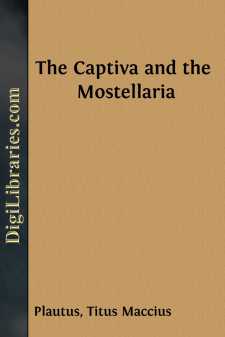Categories
- Antiques & Collectibles 13
- Architecture 36
- Art 48
- Bibles 22
- Biography & Autobiography 813
- Body, Mind & Spirit 142
- Business & Economics 28
- Children's Books 15
- Children's Fiction 12
- Computers 4
- Cooking 94
- Crafts & Hobbies 4
- Drama 346
- Education 46
- Family & Relationships 57
- Fiction 11828
- Games 19
- Gardening 17
- Health & Fitness 34
- History 1377
- House & Home 1
- Humor 147
- Juvenile Fiction 1873
- Juvenile Nonfiction 202
- Language Arts & Disciplines 88
- Law 16
- Literary Collections 686
- Literary Criticism 179
- Mathematics 13
- Medical 41
- Music 40
- Nature 179
- Non-Classifiable 1768
- Performing Arts 7
- Periodicals 1453
- Philosophy 64
- Photography 2
- Poetry 896
- Political Science 203
- Psychology 42
- Reference 154
- Religion 513
- Science 126
- Self-Help 84
- Social Science 81
- Sports & Recreation 34
- Study Aids 3
- Technology & Engineering 59
- Transportation 23
- Travel 463
- True Crime 29
The Captiva and the Mostellaria
Description:
Excerpt
THE PROLOGUE.
These two captives (pointing to PHILOCRATES and TYNDARUS), whom you see standing here, are standing here because—they are both [1] standing, and are not sitting. That I am saying this truly, you are my witnesses. The old man, who lives here (pointing to HEGIO's house), is Hegio—his father (pointing to TYNDARUS). But under what circumstances he is the slave of his own father, that I will here explain to you, if you give attention. This old man had two sons; a slave stole one child when four years old, and flying hence, be sold him in Elis [2], to the father of this captive (pointing to PHILOCRATES). Now, do you understand this? Very good. I' faith, that man at a distance [3] there (pointing) says, no. Come nearer then. If there isn't room for you to sit down, there is for you to walk; since you'd be compelling an actor to bawl like a beggar [4]. I'm not going to burst myself for your sake, so don't you be mistaken. You who are enabled by your means to pay your taxes [5], listen to the rest [6]; I care not to be in debt to another. This runaway slave, as I said before, sold his young master, whom, when he fled, he had carried off, to this one's father. He, after he bought him, gave him as his own private slave [7] to this son of his, because they were of about the same age. He is now the slave at home of his own father, nor does his father know it. Verily, the Gods do treat us men just like footballs [8]. You hear the manner now how he lost one son. Afterwards, the Aetolians [9] are waging war with the people of Elis, and, as happens in warfare, the other son is taken prisoner. The physician Menarchus buys him there in Elis. On this, this Hegio begins to traffic in Elean captives, if, perchance, he may be able to find one to change for that captive son of his. He knows not that this one who is in his house is his own son. And as he heard yesterday that an Elean knight of very high rank and very high family was taken prisoner, he has spared no expense to rescue his son [10]. In order that he may more easily bring him back home, be buys both of these of the Quaestors [11] out of the spoil.
Now they, between themselves, have contrived this plan, that, by means of it, the servant may send away hence his master home. And therefore among themselves they change their garments and their names. He, there (pointing), is called Philocrates; this one (pointing), Tyndarus; he this day assumes the character of this one, this one of him. And this one to-day will cleverly carry out this plot, and cause his master to gain his liberty; and by the same means he will save his own brother, and without knowing it, will cause him to return back a free man to his own country to his father, just as often now, on many occasions, a person has done more good unknowingly than knowingly. But unconsciously, by their devices, they have so planned and devised their plot, and have so contrived it by their design, that this one is living in servitude with his own father. And thus now, in ignorance, he is the slave of his own father....


